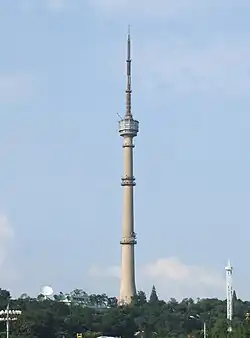Pyongyang TV Tower
Pyongyang TV Tower is a free-standing concrete TV tower with an observation deck and a panorama restaurant at a height of 150 metres (490 ft) in Pyongyang, North Korea.[1] The tower stands in Kaeson Park in Moranbong-guyok, north of Kim Il-sung Stadium. The tower broadcasts signals for Korean Central Television.
| Pyongyang TV Tower | |
|---|---|
 Pyongyang TV Tower | |
 Location within Pyongyang | |
| General information | |
| Status | Completed |
| Type | Communication tower |
| Location | Pyongyang |
| Coordinates | 39°3′0″N 125°45′31″E |
| Completed | 1968 |
| Height | |
| Roof | 150 meters |
| Pyongyang TV Tower | |
| Hangul | 평양텔레비죤탑 |
|---|---|
| Hanja | 平壤텔레비죤塔 |
| Revised Romanization | Pyeongyang Tellebijyon Tap |
| McCune–Reischauer | P'yŏngyang T'ellebijyon T'ap |
History
It was built in 1967[1] to enhance the broadcasting area, which was very poor at the time, and to start colour TV broadcasts.[2]
The Pyongyang TV Tower is chiefly based on the design of the Ostankino Tower in Moscow,[1] which was built at the same time.[3]
Features
There are broadcast antennas and technical equipment at the height of 34.5, 65, 67.5 and 85 metres (113, 213, 221 and 279 ft), located at circular platforms. An observation deck is located 94 metres (308 ft) above the ground, and the tower is topped by a 50-metre (160 ft) antenna. It uses its high-gain reflector antennas and panel antennas to produce a wide coverage of Analog and Digital TV reception, as well for radio reception.
See also
References
- Willoughby, Robert (2014). North Korea. Bradt Travel Guides. p. 140. ISBN 9781841624761. Retrieved 8 May 2018.
- KCNA (31 January 2005). "Sightseeing from the broadcasting tower of Pyongyang". Korea Is One. Archived from the original on 2 March 2005. Retrieved 20 December 2011.
- "Fire at television tower offers new evidence of Russia's decay". The Independent. Associated Press. 28 August 2000. Archived from the original on 25 October 2012.